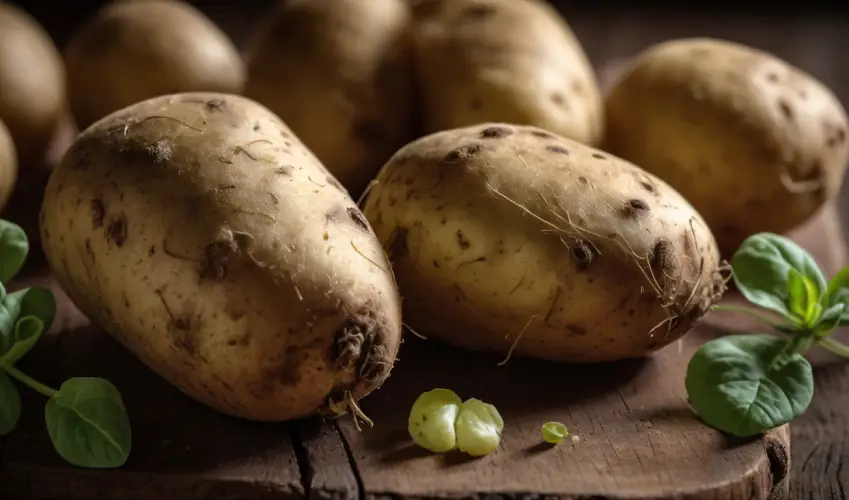Ever stumbled upon a potato in your pantry with small greenish sprouts peeking out and immediately thought, “Well, this one’s ruined”? You’re not alone. Most of us instinctively toss sprouted potatoes, assuming they’re no longer safe to eat or useful in any way. However, you might be surprised to learn that sprouted potatoes are far from useless. In fact, they can offer a variety of benefits that go beyond their typical role as a dinnertime staple.
From sustainable gardening practices to natural remedies, sprouted potatoes have hidden potential that can transform the way you think about food waste and everyday kitchen dilemmas. Let’s dive into the fascinating world of sprouted potatoes and uncover their surprising benefits.
Are Sprouted Potatoes Safe to Eat?
Before we delve into their many uses, let’s address the elephant in the room: Can you eat sprouted potatoes? The answer is yes — with a few precautions. When potatoes sprout, they produce glycoalkaloids, substances like solanine and chaconine, which can be toxic in large quantities. However, if the sprouts and any green areas are removed carefully, the potato itself is usually safe to consume.
Here’s how to safely prepare sprouted potatoes for eating:
- Cut off the sprouts and green parts: These are the areas where glycoalkaloids are concentrated.
- Peel the potato: If the skin has turned greenish, peeling it will further reduce the risk.
- Inspect for softness: If the potato is wrinkled or overly soft, it’s better to discard it.
When prepared correctly, sprouted potatoes can still be a nutritious addition to your meals. They’re rich in potassium, vitamin C, and dietary fiber — just like their non-sprouted counterparts.
The Gardening Goldmine: Planting Sprouted Potatoes
One of the most exciting uses for sprouted potatoes is giving them a second life in your garden. Those tiny sprouts are actually the first signs of new potato plants waiting to grow. Instead of tossing sprouted potatoes, why not plant them and grow your own supply?
How to Plant Sprouted Potatoes:
- Cut into chunks: If the potato has multiple sprouts, cut it into pieces, ensuring each piece has at least one sprout.
- Let them dry: Allow the cut pieces to dry for 24-48 hours to prevent rotting.
- Plant in soil: Place the sprouted side up in well-draining soil about 4 inches deep.
- Water regularly: Keep the soil moist but not waterlogged.
- Harvest in a few months: After a few months, you’ll be rewarded with fresh, homegrown potatoes.
This simple process not only reduces food waste but also gives you a sustainable source of fresh produce.
Sprouted Potatoes as Natural Fertilizer
If planting isn’t your thing, sprouted potatoes can still benefit your garden as a natural fertilizer. Potatoes are rich in nutrients like potassium and phosphorus, which are essential for plant growth. Simply chop up the sprouted potatoes and bury them in your compost pile or directly into garden soil. Over time, they’ll decompose and enrich the soil with valuable nutrients.
DIY Natural Remedies with Sprouted Potatoes
Believe it or not, sprouted potatoes have been used in traditional remedies for centuries. Here are a few ways they can come in handy:
1. Soothing Burns and Skin Irritations
Potatoes contain anti-inflammatory properties that can help soothe minor burns, rashes, or insect bites. Simply grate a sprouted potato and apply the pulp directly to the affected area for relief.
2. Relieving Puffy Eyes
The starch in potatoes can reduce puffiness and inflammation around the eyes. Slice a sprouted potato thinly (removing any green areas) and place the slices over your eyes for 10-15 minutes.
3. Pain Relief for Minor Aches
Some people use potato compresses to alleviate minor aches and pains. Boil a sprouted potato, mash it, wrap it in a cloth, and apply it to sore muscles or joints.
FAQs About Sprouted Potatoes
Q: Can I eat sprouted potatoes raw?
A: No, it’s best not to eat raw potatoes — sprouted or not — as they contain compounds that can be hard to digest and potentially harmful.
Q: How can I prevent my potatoes from sprouting?
A: Store potatoes in a cool, dark, and well-ventilated place. Avoid storing them near onions, as this accelerates sprouting.
Q: What if my potato is soft and shriveled?
A: If the potato is significantly soft or shriveled, it’s better to compost it rather than eat it or plant it.
Q: Can I use sprouted sweet potatoes in the same way?
A: Yes! Sweet potatoes with sprouts can also be planted or used in similar ways as regular potatoes.
Final Thoughts
The next time you spot sprouts on your potatoes, think twice before throwing them away. Whether you choose to eat them (after proper preparation), plant them for a fresh harvest, or use them in creative ways around your home and garden, sprouted potatoes are far more versatile than they appear at first glance.
By embracing the potential of sprouted potatoes, you’re not only reducing food waste but also discovering new ways to make the most of what you already have. So go ahead — uncover the surprising benefits of sprouted potatoes and give these misunderstood spuds a second chance!
